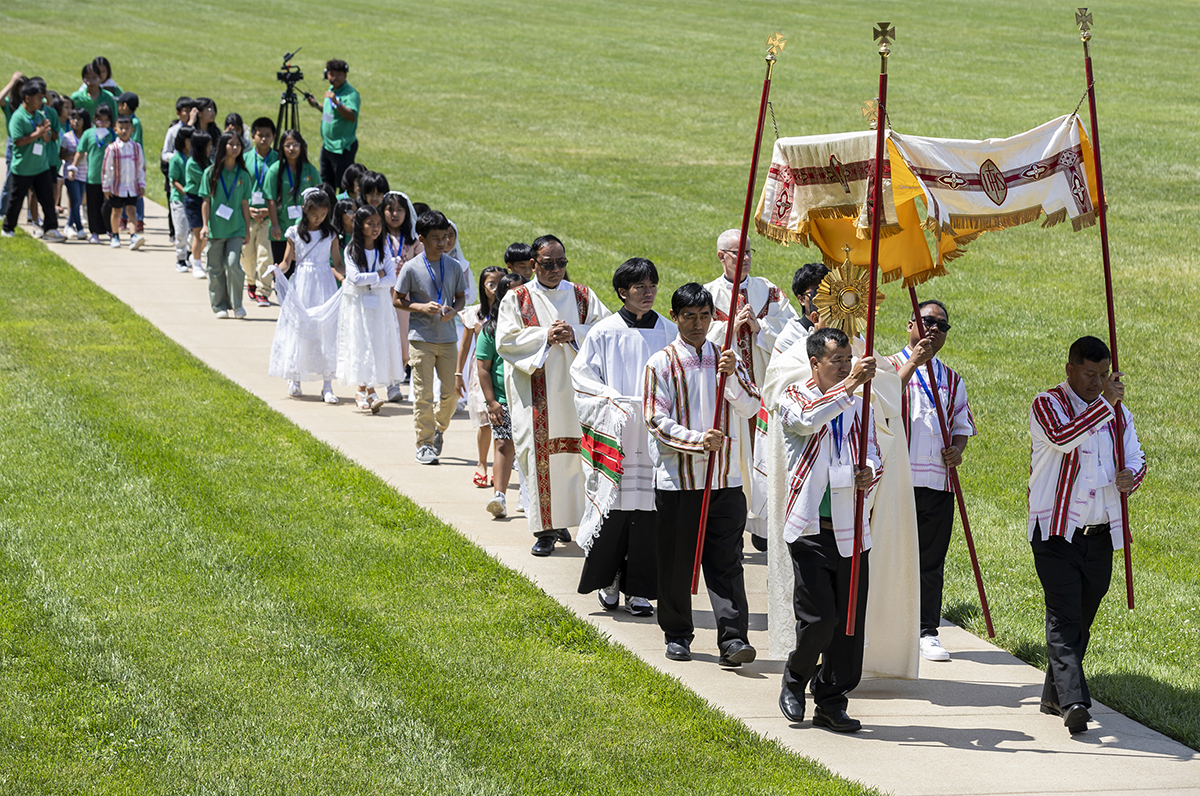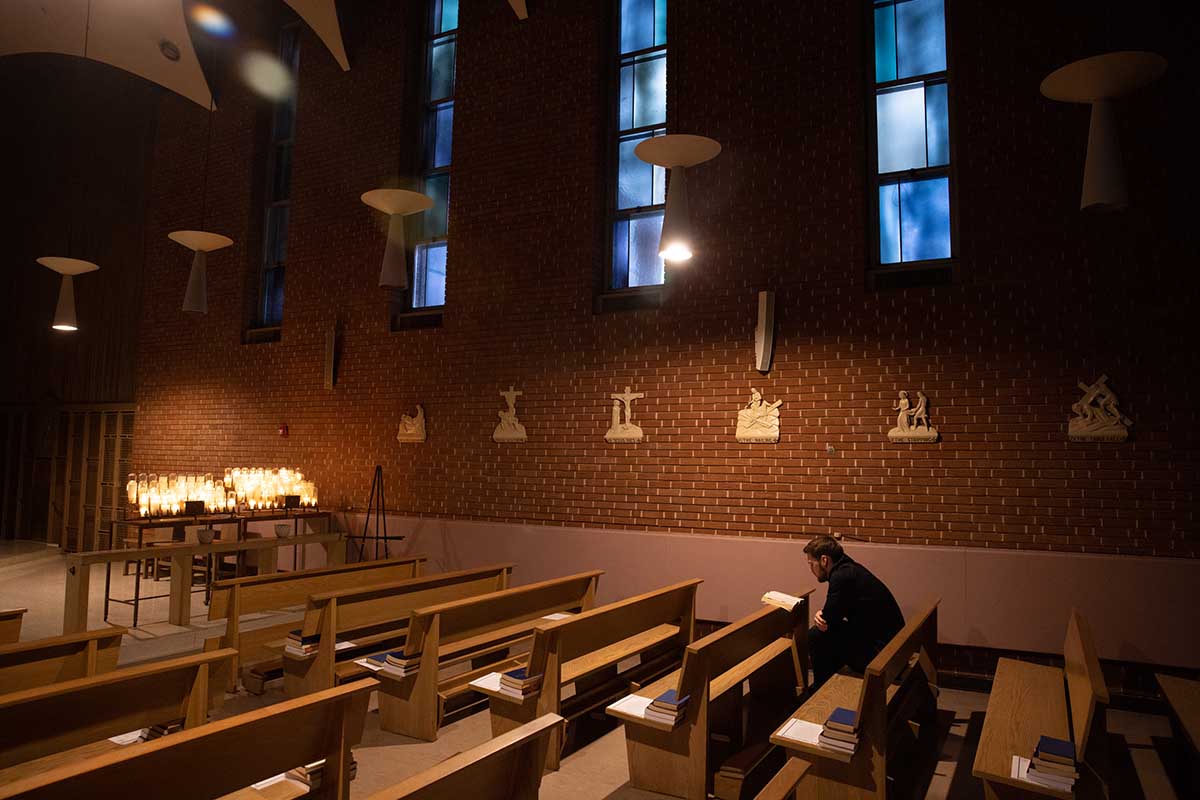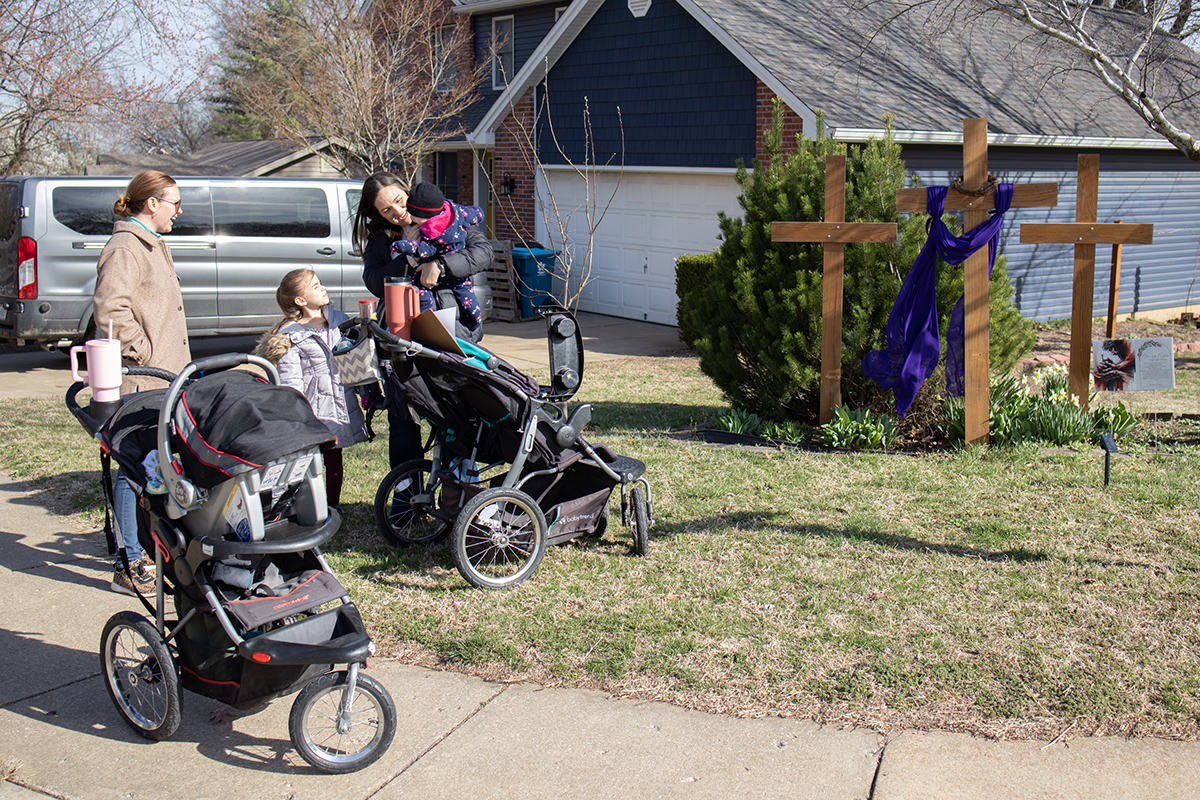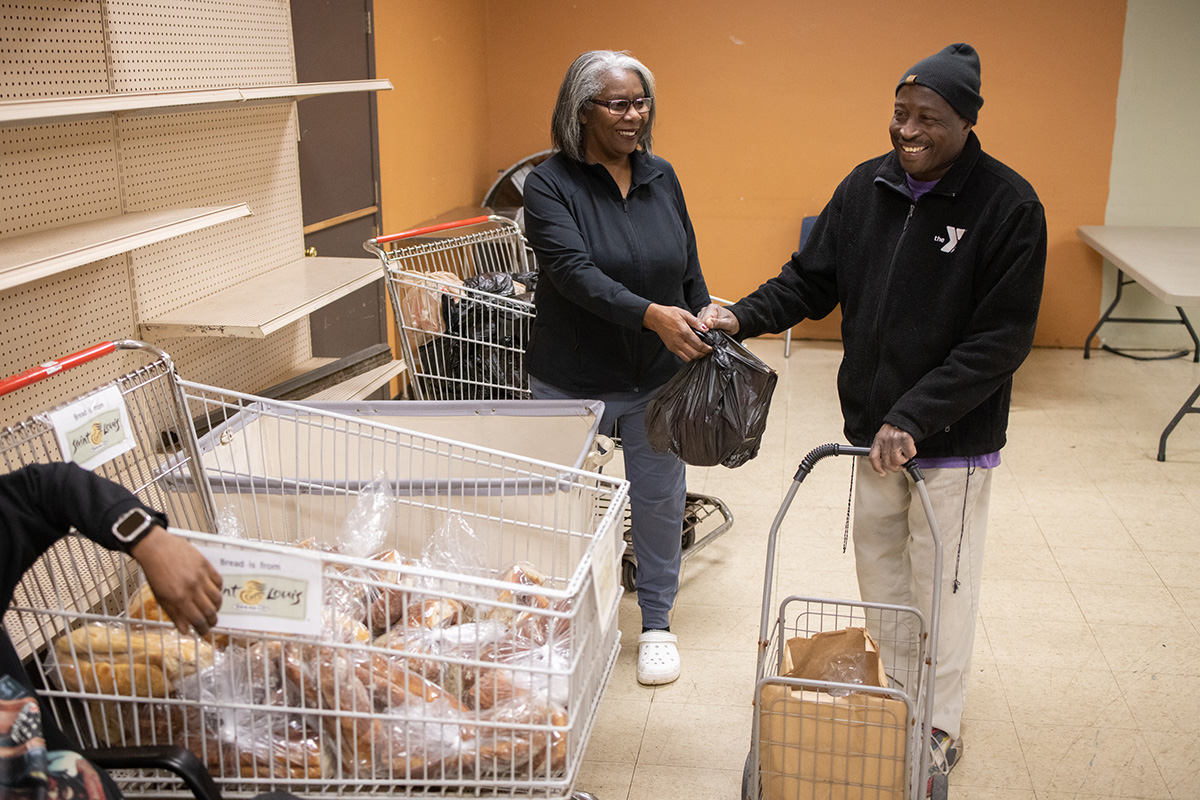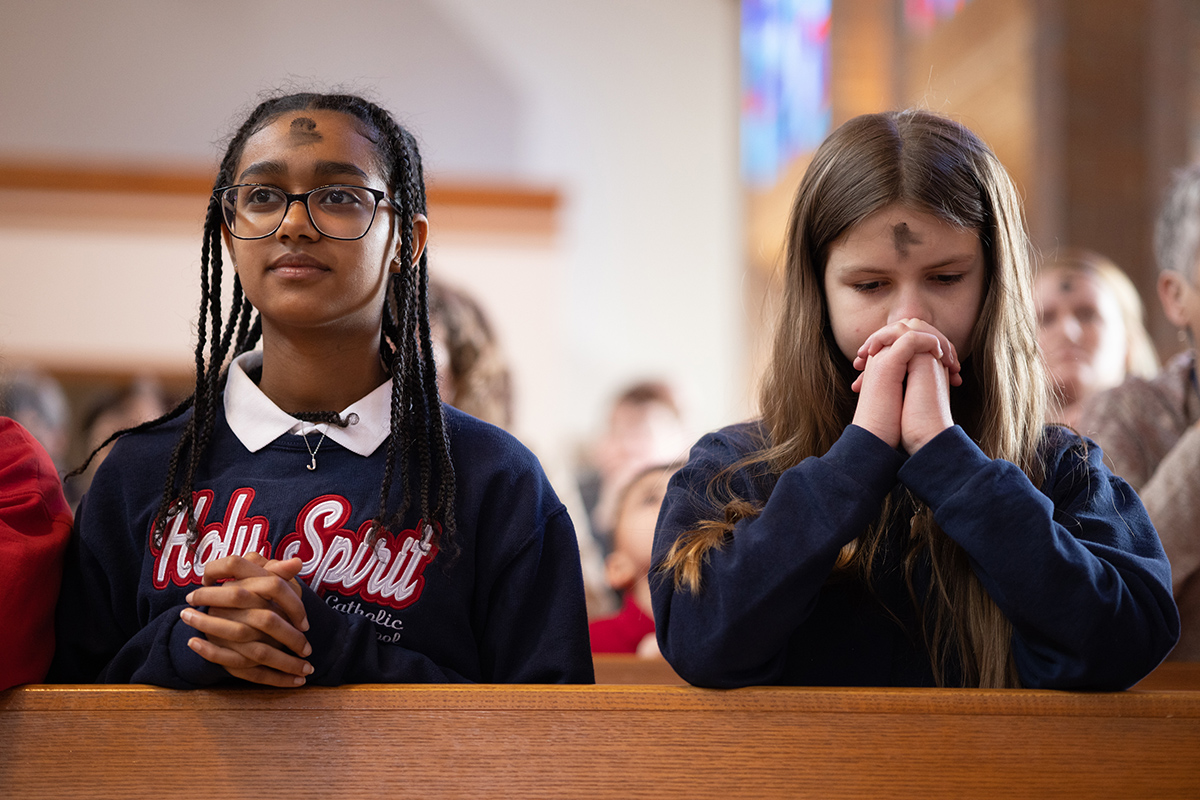Our Joyful Encounter with the Lord

Living the joy of the Gospel in St. Louis
(Introduction, published Oct. 23, 2017. Scroll down to find section 1, published Dec. 18, 2017; section 2, published Feb. 12, 2018; and section 3, published April 2, 2018.)
Something has to change. Everyday, our news is full of stories of hatred, violence and a clearly divided nation. It’s easy to look around at everything that’s wrong in the world and not know where to begin. Let me suggest that we begin with the one thing most in our control: us.
Even in the midst of the obvious hurt, confusion and even despair among our brothers and sisters, we can be a people of hope — a hope that’s rooted in our redeemer and the gift of life that He offers us.
The first and best way to maintain our hope, and to spread hope to others, is to encounter Jesus. I echo the invitation of Pope Francis in the beginning of his apostolic exhortation “The Joy of the Gospel” (“Evangelii Gaudium”):
“I invite all Christians, everywhere, at this very moment, to a renewed personal encounter with Jesus Christ, or at least an openness to letting Him encounter them; I ask all of you to do this unfailingly each day. No one should think that this invitation is not meant for him or her, since ‘no one is excluded from the joy brought by the Lord.'” (“Evangelii Gaudium” 3)
What a profound invitation! The Holy Father gives us an essential reminder: whether we have been on this journey of discipleship for many years or we are just beginning, we can only continue on our path if we are willing to encounter Jesus anew each day. Even when we don’t feel ready for the encounter, we can create room in our hearts and let Jesus do the rest.
An encounter with Jesus cannot help but change us, just as it did for Matthew the tax collector, Mary Magdalene, Zaccheus and so many more. Jesus didn’t allow them to let their sinful pasts hold them back. Their pasts simply became an occasion for Him to demonstrate His rich mercy. He can do the same for each of us. And, building on us, He can do the same for our city, our country and our world.
This first step of encountering Jesus, then, will transform our world, for “if we have received the love which restores meaning to our lives, how can we fail to share that love with others? (“Evangelii Gaudium” 8) When we begin to share this love in meaningful ways with everyone with whom we come in contact, the world is a better place and we have done our part to help overcome the despair that is prevalent in our society. Imagine the power of the more than 500,000 Catholics in the Archdiocese of St. Louis living this way.
I invite each of us to consider this daily encounter in our own lives and to reflect upon how we may foster this encounter in the lives of those around us: our family, our neighbors, our parishes. If we hope to truly live and share the joy of the Gospel in St. Louis, we must begin with encountering the living Gospel, Jesus Christ. It’s one small step that will have a lasting impact on us and all with whom we share our lives.
How to Encounter
While there are many ways we can encounter Jesus, two of the most basic ways have a long standing tradition in the Church: Word and Sacrament.
St. Jerome is famously quoted as saying “Ignorance of Scripture is ignorance of Christ.” How many of us know the Scriptures as well as we should?
The first step in getting to know Christ through the Scriptures is simply to read the Gospels. There are 89 chapters in the 4 Gospels. If you read one chapter a day you’ll finish in three months. If you begin again, you can read them all through four times in a year. If you continue to do this, the Word of Christ will penetrate your heart and life.
In addition, as an aid to understanding the Scriptures, a great variety of dynamic Scripture study tools are readily available online.
Participating in the Eucharist at Mass and through Adoration of the Blessed Sacrament is another central way to encounter Christ. This encounter unites us with Christ and the Church around the world and history through the communion of saints.
Many times, in order to encounter the Lord, it helps to step out of our daily routine and create time and space for the Lord to speak to us. This is why retreats are an important and transformative part of the Christian life. Many parishes host ACTS retreats, or offer silent retreats to help foster encounters with the Lord.
Do not wait! As Pope Francis reminds us, this encounter must be daily; I implore you to accept the same invitation Jesus gave to the disciples “Come and you will see.” If we’re willing to encounter the Lord, He will transform our hearts, our parishes and our world.
“The joy of the gospel fills the hearts and lives of all who encounter Jesus. With Christ joy is constantly born anew. In this Exhortation I wish to encourage the Christian faithful to embark upon a new chapter of evangelization marked by this joy, while pointing out new paths for the Church’s journey in years to come. ” (“Evangelii Gaudium,” 1)
Encounter. Remember. Give Witness.
Called to ‘be more’ in expressing the joy of the Gospel
(Section 1, published Dec. 18, 2017)
An encounter with Jesus is at the heart of the Christian journey.
But that encounter is not the end. After we have encountered the Lord, we must remember this encounter as the source of our life and witness.
Salvation history teaches us the significance of remembering our encounters with the Lord. The Book of Judges tells of a repeated cycle in which Israel forgets its covenant with God and recounts the disastrous consequences of this failure to remember. Psalm 105 provides a beautiful recollection of God’s faithfulness, and a call to remain mindful of all that God has done: “Remember the wonderful works He has done, His miracles, and the judgment He uttered, O offspring of His servant Abraham, children of Jacob, His chosen ones.” As Pope Francis points out: “The joy of evangelizing always arises from grateful remembrance” (“Evangelii Gaudium” 13).
From reading the Gospels and from the examples of holy men and women, we know how important this grateful remembrance is. To put it starkly: even Judas had a profound encounter with the Lord. He failed, as the Pharisees failed, to foster a grateful remembrance of that encounter. If we don’t foster grateful remembrance, we court their fate.
In addition to encounter and grateful remembrance, we must give witness to our experience of the saving love of God in Christ Jesus. This is true even when we don’t feel prepared or seem to have all the answers. Pope Francis challenges us on this point:
“(A)nyone who has truly experienced God’s saving love does not need much time or lengthy training to go out and proclaim that love … If we are not convinced, let us look at those first disciples, who, immediately after encountering the gaze of Jesus, went forth to proclaim Him joyfully: “We have found the Messiah!” (John 1:41). The Samaritan woman became a missionary immediately after speaking with Jesus and many Samaritans come to believe in Him “because of the woman’s testimony” (John 4:39). So too, St. Paul, after his encounter with Jesus Christ, “immediately proclaimed Jesus” (Acts 9:20; 22:6-21). So what are we waiting for?” (“Evangelii Gaudium” 120)
Being more: Prayer and action
Encounter. Grateful remembrance. Joyful witness. It might seem overwhelming. The question nobody probably wants to hear is: How can we do more?
But let’s step back for a moment. Our first call as missionary disciples isn’t necessarily to do more. Our first call is to be more.
What does that mean?
In part, it means avoiding the temptation to jump into mission without cultivating fertile ground in which to plant seeds of evangelization. When the soil is rich, the outward manifestations of our faith come more easily and bear greater fruit.
How do we build a foundation in Christ? First and foremost, by becoming a people of prayer.
Too often our contemporary world is skeptical, distrustful and hostile toward prayer. Many struggle to find the value and effectiveness of prayer, especially when confronted by human brokenness, tragedy and violence. Appeals to prayer can be interpreted as inauthentic: “But it doesn’t do anything.”
We aren’t asked to choose between prayer and action — Christians know that’s a false dichotomy. Rather, we’re called to make prayer the root of our action.
Mother Teresa was a great example of this. She spent an hour every day praying before Christ in the Blessed Sacrament. She made it part of the Rule of Life for all Missionaries of Charity. When asked why they took this precious time for prayer, especially when there were so many practical demands on their time and energy, she explained: “because we find that through our daily holy hour our love for Jesus becomes more intimate, our love for each other more understanding, and our love for the poor more compassionate.”
For Mother Teresa and the Missionaries of Charity — and for us — there’s no choice between prayer and action. Instead, there is an intimate connection between the two.
In the story of Martha and Mary (Luke 10:38-42), Jesus reminds Martha that being with Him is what matters most, whatever tasks we may have to face. The Martha in each of us needs to recognize that being in communion with God in prayerful contemplation comes first. When we have listened attentively to Jesus’ words, our solidarity with others will be more profound.
To be missionary disciples we have to remain attentive to these two interrelated dimensions of our Christian journey.
“(W)ithout prayer all our activity risks being fruitless and our message empty. Jesus wants evangelizers who proclaim the good news not only with words, but above all by a life transfigured by God’s presence” (“Evangelii Gaudium” 259).
Models of being more
The Catholic tradition contains great examples of men and women who have lived this careful balance of prayer and action.
St. Rose Philippine Duchesne, one of the patrons of our archdiocese, is an excellent example of what it means to “be more” through prayer and action. St. Rose Philippine’s witness has a timely significance for us today in our local Church. As a woman, religious, immigrant and missionary, her story might speak to us at different levels. In this brief reflection on her life and work, I want to highlight her identity as an immigrant-missionary (I encourage you to visit her shrine in St. Charles for a more detailed appreciation of her story and contributions).
It’s truly amazing to see God’s work in her life as an immigrant-missionary. We can only imagine how difficult it must have been for her to undertake the journey from her homeland to the New World. She had to leave behind the comforts of her close friends, family, religious community, culture and language. Yet, she never abandoned her childhood dream of the mission.
We know from her biographies that she remained committed to her deeper longing of one day serving as a missionary to the Native Americans in the New World. And, after a lifelong wait, at age 72, she finally realized her own ambition of serving the Native Americans through a mission to the Potawatomi in Kansas. As an immigrant-missionary she struggled with learning at least two new languages, English and Potawatomi. Rather than let this be an obstacle to her witness, she became known as the “woman who prays always.” Even though she wasn’t able to speak to the Native Americans in their own tongue, they recognized her faithfulness and zeal. Many came to know Jesus because of her witness.
Each of us is called to imitate St. Rose Philippine Duchesne in her faithfulness to God’s call no matter what the circumstances and the worldly view of success. Her commitment to her dream of being a missionary, her devotional life and prayer are good examples of a life lived in contemplation and action.
Another example of “being more” in prayer and action is St. Therese of Lisieux, the Little Flower. This great 20th-century saint is the patroness of missions for the Universal Church, even though she lived most of her short life in a cloistered convent. St. Therese dedicated herself to “the little way,” offering up her every moment and act of every day to Christ for the salvation of souls. For St. Therese, “Holiness consists simply in doing God’s will, and being just what God wants us to be.”
St. Therese is an especially potent example for our young people. She entered the convent while quite young. She didn’t let her youth stand as an obstacle for gaining holiness or having a profound impact upon the Church. Her example of prayer and little acts of kindness shows all of us how significant our ordinary lives can be. As she says, “Miss no single opportunity of making some small sacrifice, here by a smiling look, there by a kindly word; always doing the smallest right and doing it all for love.”
Finally, consider Mary, the Mother of Jesus. Father Jean Corbon once wrote that “the most fruitful human activity is to receive the love of God.” Mary is the perfect example of this truth. Mary received the Word of God, nurtured the Word in her womb, and brought Him forth for the salvation of others. She is a great model for what it means to be more. Each of us, in our own way, can receive the Word, nurture Him in our hearts in prayer, and bring Him forth in our actions.
But is it really possible for us to follow Mary’s example? Pope Francis thinks so. He states: “The close connection between Mary, the Church and each member of the faithful, based on the fact that each in his or her own way brings forth Christ, has been beautifully expressed by Blessed Isaac of Stella: ‘In the inspired Scriptures, what is said in a universal sense of the virgin mother, the Church, is understood in an individual sense of the Virgin Mary… In a way, every Christian is also believed to be a bride of God’s word, a mother of Christ, His daughter and sister, at once virginal and fruitful… Christ dwelt for nine months in the tabernacle of Mary’s womb. He dwells until the end of the ages in the tabernacle of the Church’s faith. He will dwell forever in the knowledge and love of each faithful soul'” (“Evangelii Gaudium” 285).
We have our own ways of receiving the love of God, nurturing it in prayer, and bringing it forth in action for the sake of others. We don’t need to do big things. We need to do every little thing in God’s love.
If we can begin, even in little ways, to live like these holy women in our daily lives we, too, can make Jesus known in a profound and powerful way that can transform the world.
A Challenge — Practical steps for being more
In our effort to live the Joy of the Gospel and to be missionary disciples, we must be willing to be challenged and to grow, so allow me to challenge you to be more in a few different areas of your life.
At home: Commit to daily prayer and personal accountability. Invite a roommate, your spouse or a friend to walk with you in your pursuit of Christian virtue and holiness. This shared discipleship is a great aid in pursuing missionary discipleship.
As a parish: Commit to providing opportunities for the members of your parish to grow as missionary disciples together. Offer a monthly communal adoration night, faith formation opportunities for youth and adults and set up extra opportunities for confession beyond the normal Saturday hours.
In your community: Let your life and your words witness the joy of the Gospel. Talk to a neighbor or co-worker about your faith. Share your energy and your passion for growing closer to the Lord as a missionary disciple and invite others to evaluate their relationship with God. Commit to regular acts of service that require your time, not just your money.
An encounter in solidarity and love
As pilgrims and missionary disciples, we are called to choose compassion over indifference
(Section 2, published Feb. 8, 2018)
“We, though many, are one body in Christ and individually parts of one another.” — Romans 12:5
As missionary disciples who seek to be more, we know how important it is to share our faith, hope and love with others. From our own encounters with Jesus, we’ve seen how He leads us to embrace one another just as He has embraced us. This kind of intentional being-together-in-community is called “solidarity.”
Our life in the Church testifies to the truth and the importance of solidarity. We never really walk or stand alone. And our Gospel identity as a pilgrim Church — a Church on the way — signals how much of our faith journey involves a deliberate encounter with others. In Pope Francis’ words: “True faith in the incarnate Son of God is inseparable from self-giving, from membership in the community, from service, from reconciliation with others.” (“Evangelii Gaudium” 88).
This exhortation to encounter one another implies moving closer to those who aren’t readily in our circle, both physically and emotionally. It means opening our minds and hearts and giving our time and energy to the lives of others, especially the most poor and vulnerable. At the core of our human encounters is the call to love others as God has loved us — up close and personal.
The story of the Good Samaritan (Luke 10: 29-37) illustrates how Jesus summons each one of us to a greater solidarity.
In the story and person of the Good Samaritan, we discover that our faith requires more than simply words or beliefs. It isn’t the priest with his faith, nor the Levite with his knowledge of the law, who shows us the path of discipleship. Instead, the Samaritan, the supposed “stranger” who acts with mercy and kindness, shows solidarity with the one he encounters on the way.
In the Good Samaritan, we see that compassion and solidarity mean being with and for others in concrete ways. Through the story, Jesus invites us to imagine ourselves on the road. He asks us to stop and reach out when we behold the brokenness of humanity. How we respond to others in their need for mercy, healing and reconciliation becomes the core of our discipleship. It’s the perfect illustration of what St. James says: “So also faith of itself, if it does not have works, is dead.” (James 2:17)
Like the priest and the Levite, there are moments when we have turned our gaze away from the hurt, or haven’t stopped to tend to it. We can be honest and repent for those times when our actions haven’t mirrored God love.
But sometimes we’ve received that love through others. And sometimes we’ve given that love to others. We can be thankful for God’s grace in those times.
In the Good Samaritan, we recognize a challenge: a call to solidarity. Our faith requires us to be open to others on the way, to be willing to show care and compassion for them. The Good Samaritan also illustrates the need to be courageous in transcending our own class and cultural distinctions in order to show God’s love more fully. As pilgrims and missionary disciples, we are called to choose compassion over indifference.
Contemplative love
Pope Francis tells us that another essential part of missionary discipleship is encountering those in need with contemplative love. He wrote, “What the Holy Spirit mobilizes is… above all an attentiveness which considers the other ‘in a certain sense as one with ourselves.’ This loving attentiveness is the beginning of a true concern for their person which inspires me effectively to seek their good. This entails appreciating the poor in their goodness, in their experience of life, in their culture, and in their way of living faith. True love is always contemplative” (“Evangelii Gaudium” 199).
What does this contemplative love mean for us in our daily lives? It means, for example, being fascinated by others. It means wanting to know what they think, how they feel and what they want. It means wanting to know the joys and the hurts in their past, where are they now, and what they hope and fear for the future. It means sharing their joys and sorrows and hopes and fears. It means looking on them the way God looks on us, and sharing their lives the way Jesus shares ours.
Learning to cultivate a contemplative encounter with others takes time and courage. We do it naturally with those closest to us. We need to do it more readily for the poor and vulnerable who are among us, but often go unnoticed.
It isn’t easy to leave our familiar surroundings. We may have grown up in a relatively homogeneous social environment or neighborhood that provided limited encounters with others of a different race, ethnicity, political persuasion or socio-economic background. We may have had negative encounters with others that discouraged us from going beyond our personal comfort zones.
Yet we know in faith that we’re part of a universal Church. We know that our Catholic faith, life and values are present in every culture and place in the world. In some instances we’ve been directly exposed to other cultures, ethnicities and languages through the missionary work of the Church. The Archdiocese of St. Louis, for example, has been a missionary community for over fifty years! Through the work of our archdiocesan Mission Office we have been able to share resources with our sisters and brothers in Bolivia and other parts of Latin America. And, in recent years, we have been able to join in the missionary work of the Messengers of Peace in Colombia. We have reached out to our brothers and sisters in faraway places, and learned to behold them with contemplative love.
We’ve been missionaries at home, too. Each year, through your prayers and generosity, the Annual Catholic Appeal allows archdiocesan ministries and offices to respond to the needs of those in our own backyard. The Appeal supports Catholic Charities, the St. Charles Lwanga Center, the Respect Life Apostolate, Hispanic Ministry the Regina Cleri priest retirement home, and others to reach out to our brothers and sisters in need in our own place and time, and learned to behold them with contemplative love.
But the mission still calls to each of us. Growing in contemplative love isn’t only a task for someone else. We’re called to see people in need with new eyes. Be fascinated by those you encounter. Desire to know their story. Ask about their lives. Be drawn to where the hurt is, not away from it. A physician or nurse or physical therapist is especially attentive to where the hurt is because that’s where their help is most needed. As missionary disciples we need to do that for each other.
The Archdiocese of St. Louis is blessed to have three patron saints

